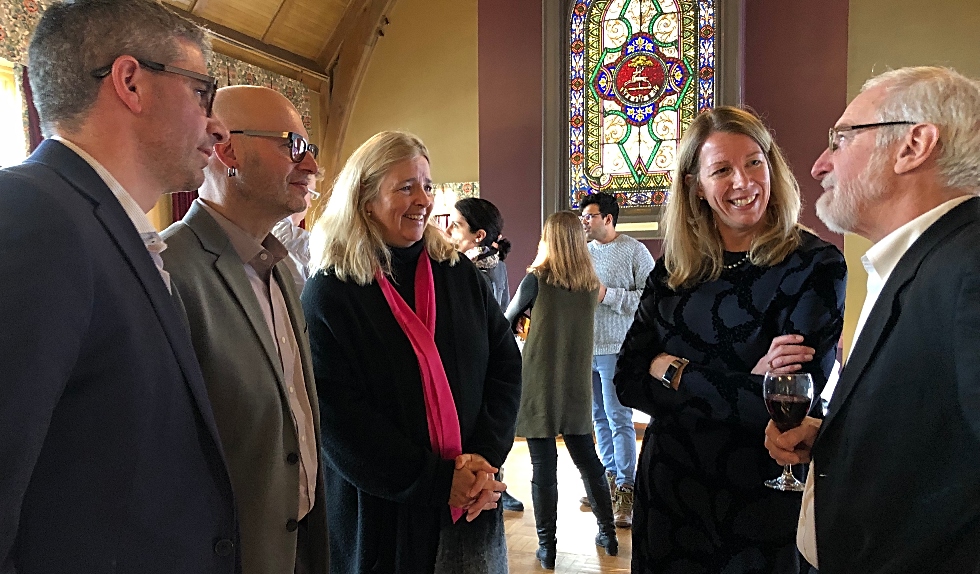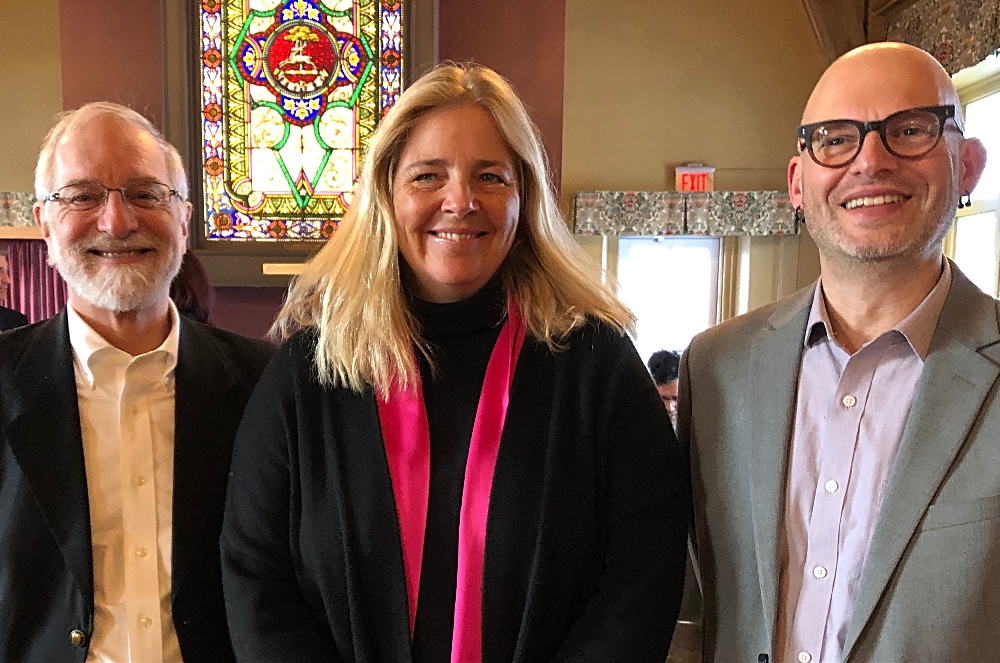Three outstanding researchers named inaugural Science Research Chairs

(From left) Gianni Parise, associate dean research and external relations, Faculty of Science; Kari Danoki-Veress, professor, Department of Physics & Astronomy; Allison Williams, professor, School of Geography & Earth Sciences; Maureen McDonald, dean of the Faculty of Science; Michael Brook, professor, Department of Chemistry & Chemical Biology. Dalnoki-Veress, Williams and Brook have been named the inaugural Faculty of Science Research Chairs.
BY Erica Balch
March 18, 2019
Three exceptional McMaster researchers from the Faculty of Science are being recognized for their research excellence.
Kari Dalnoki-Veress, Allison Williams, and Michael Brook – all leaders in their fields – have been named the inaugural Faculty of Science Research Chairs, part of a new program developed by the Faculty to highlight the achievements of its researchers and support their work with a three-year funding commitment.
“I congratulate each of these talented researchers on this achievement,” says Maureen MacDonald, Dean of the Faculty of Science. “Not only have they built successful research programs here at the University, they have – through their significant research contributions and collaborations – also made important advances in their respective fields nationally and internationally, the impact of which can be felt on McMaster’s campus and well beyond.”

The Faculty of Science Research Chairs were nominated – along with 15 other outstanding researchers from the Faculty of Science – by their peers and selected by a review committee representing a number of disciplines within the Faculties of Science and Engineering.
The Science Research Chairs program is one of a number of initiatives developed by the Faculty of Science within the past few years aimed at accelerating and supporting research excellence and international collaboration within the Faculty. Additional programs include: The Science Interdisciplinary Fund; the Post-Doctoral Research Fellows competition; the Post Leave Support Program; and the Research Infrastructure Renewal Fund.
The Faculty of Science Research Chairs:
Kari Dalnoki-Veress, a professor in the Department of Physics & Astronomy, studies physics of soft condensed matter, colloquially termed “squishy physics.” He has established an international reputation in the study of soft and living matter at surfaces and interfaces. Some of his work has focused on living cells, while other projects have studied complex fluids, and self-assembly and patterns.
For his contributions, he has received the Rutherford Memorial Medal in Physics from the Royal Society of Canada, been elected to the Fellowship of the American Physical Society, and received the Canadian Association of Physicists’ Brockhouse Medal with long-time collaborator, James Forrest, among many other honours. Most recently his start-up company, MesoMat, was awarded the grand prize in the Hamilton Lion’s Liar Competition.
Allison Williams, a professor in the School of Geography & Earth Sciences and CIHR Research Chair in Gender, Work and Health (2014‐2019), is a social/health geographer and has led multiple SSHRC and CIHR Team grants. Her research focusses on understanding the challenges faced by employees who are caring for aging, chronically ill, or disabled loved ones while continuing to work full or part-time. She has been sought out by the United Nations for her work specific to unpaid care.
Recently Williams’ work with her partners, including the Canadian Standards Association (CSA) among others, led to the creation a bilingual Caregiver Inclusive and Accommodating Workplace Organizations toolkit aimed at providing employers with strategies to help accommodate caregiver employees.
Read: New guidelines offer solutions to create “caregiver -friendly workplaces
Michael Brook, a professor in the Department of Chemistry & Chemical Biology, studies how silicones behave, how that behaviour could be controlled, and how to improve both silicones themselves and their environmental profile.
Brook’s expertise has been widely recognized. In 2016, he was awarded the F. S. Kipping Award in Silicon Chemistry from the American Chemical Society – the highest honour, internationally, in his field. In 2017, Brook became a Distinguished University Professor and received the Macromolecular Science & Engineering Award from the Chemical Institute of Canada.
Read: Renowned McMaster expert recognized for his contribution to silicone science
The new chairholders join an impressive roster of Canada Research Chairs, Endowed Research Chairs, McMaster University Scholars, Distinguished University Professors and national and international research award winners from the Faculty of Science, as well as McMaster’s only Canada 150 Research Chair. See the full list


